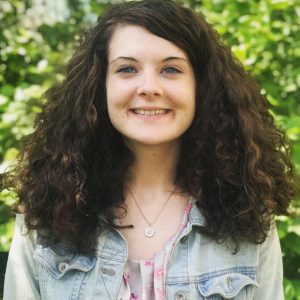Nanotechnology at Northwestern
Meet Kate Dray, a PhD student in the Leonard Lab and Bagheri Lab
May 22, 2020
Kate Dray is a doctoral student in Prof. Joshua Leonard’s lab, which focuses on cellular devices and biomolecular engineering, and Prof. Neda Bagheri’s lab, which focuses on modeling dynamic life systems.
 Where are you originally from?
Where are you originally from?
I am originally from Sugar Grove, a small town in the western suburbs of Chicago.
Where did you complete your undergraduate degree?
I got my bachelor’s degree in Chemical Engineering from the University of Kentucky in Lexington, KY.
What year are you now?
I am a PhD Candidate in my 3rd year.
When did you first become interested in engineering, and what are your research interests?
I always really enjoyed math and science classes in middle school and high school, so I chose to pursue a degree in engineering in college. I also really enjoy solving problems and thought that pursuing a career in engineering would enable me to solve important, real-world problems in a systematic way. I currently work in the field of synthetic biology. As synthetic biologists, we repurpose native biological machinery to address challenges in medicine and biotechnology. I am specifically interested in systematically building and analyzing mathematical models that can describe and predict the performance of our synthetic biological systems. These computational techniques can provide important insight towards our general understanding of how each system works and towards improving our technologies.
How do you explain what you study to non-scientists?
We use engineering principles to repurpose biological systems for new uses. For example, we can build cells that are able to specifically sense certain biological signals that are indicative of disease states and respond with the production of a therapeutic. I use math to describe how our engineered biological systems work. This enables us to have a better understanding of how our systems work and how we can build better systems!
You’re part of an ambitious effort to develop a one-step diagnostic tool that could be used to detect the COVID-19 virus. What drew you to this project? Which aspect are you working on, and how does that fit into the big picture?
This project is extremely exciting! I was asked to be part of the modeling team and immediately said yes. I think we are all feeling a little bit helpless given the current global situation and I feel so lucky to have been given the opportunity to participate in a project that could have such a significant impact in the world.
A key challenge in this project is identifying an appropriate mechanism that achieves the desired sensitivity to the viral target and time to response. Each mechanism differs in the series of reactions steps in between sensing of the viral target and subsequent fluorescent output that is used to determine whether the test is positive or negative. As part of the modeling team, I am working on developing mathematical models that describe each of these mechanisms. We can then use these models to rapidly scan through different mechanisms and other experimentally tunable conditions to identify promising mechanisms that the experimentalists can then test in the wet lab. In this way, mathematical modeling has the potential to significantly reduce the number of experiments necessary to identify a successful mechanism.
What has been a highlight of your time at Northwestern?
This might be an unpopular answer, but I really enjoyed preparing my proposal document and presentation for my qualifying exam. It was really exciting to take a step back and think about the long-term goals of the work that I want to accomplish, and what steps I need to take to accomplish my goals.
What has been the most challenging aspect of your work or your time here?
My first year was very tough for personal reasons, as someone very close to me passed away a few weeks before I started my first year at Northwestern. It took me a really long time to adjust to the life of a graduate student and find a project that I was excited about. However, I did eventually adjust and find a project that I absolutely love. In addition to being excited and motivated by the end goals of my project, I enjoy the day-to-day work (especially writing code and making figures!) I included this because I imagine that there is someone reading this who is going through a similar struggle and I want to remind them to hang in there and that it will get better.
Can you tell me about a mentor who has helped you in your career?
My advisor, Dr. Josh Leonard, has been an incredible mentor during my time at Northwestern. His contagious excitement about our work keeps me excited about our work. I know that I can reach out to him for help anytime that I am struggling, with a confidence that I will feel 100x better after a meeting with him. Not only is Josh an incredible mentor from the technical side of things, but he is truly just a fantastic person in general. As an example, I really respect the way that he has handled lab business in light of the COVID-19 situation. He has consistently prioritized the safety and well-being of his team, while also pushing us forward as scientists.
What are your hobbies outside of the lab?
I love cooking and baking, especially trying new recipes! I love drinking coffee and trying beans from different roasters. I also enjoy hanging out with my dog, Melvin, and taking him on long walks.